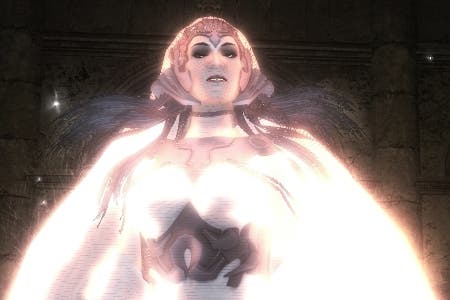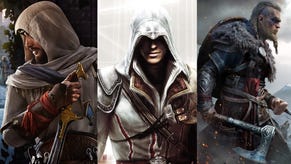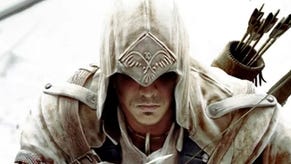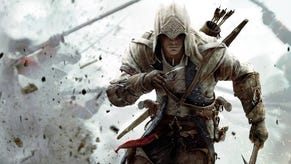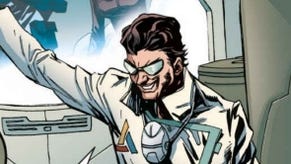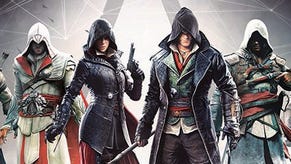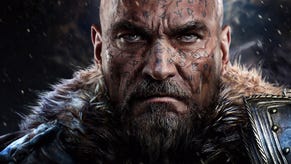Assassin's Creed 3 ending analysis
Juno what it all means?
Spoiler warning: The following article discusses the ending of Assassin's Creed 3 in detail.
Assassin's Creed 3 ends with a choice. Desmond Miles, the series' modern-day hero, is asked to decide between dooming the world to a fiery apocalypse or placing its future in the hands of Juno, a vengeful godlike figure from the series' mysterious precursor race. The former allows him to live, the latter ensures his death. Desmond sacrifices himself to see the Earth saved.
It's an interesting narrative decision for a character that's part of the Assassins faction, a group who have fought for humanity's right to free will across the centuries. Desmond's pragmatic choice sounds more like something his rivals, the Templars, would go for - they who continually argue that humans need order and a firm hand to guide them and that free will is dangerous.
But you could argue it the other way, too. By ensuring humanity's survival (we're told the opposite would not wipe out humankind but return civilisation to the Dark Ages, its populace decimated), Desmond is ensuring that free will endures. He acquiesces to Juno in the same breath as he promises the Assassins will fight her rise to power. It's also an 11th-hour decision forced upon him (deliberately so) where there is no third path.
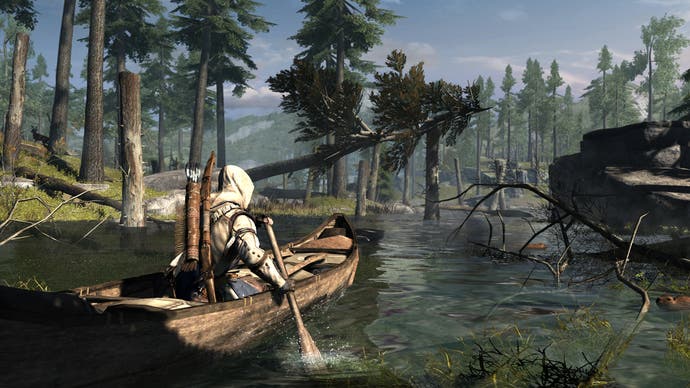
The lack of a clear black-and-white decision for Desmond concludes a tale that allows its characters to embrace every shade of grey. There's no better example of this than the twist dropped on players after hours spent playing as Haytham Kenway - that you and your merry band of accomplices are Templars, aiming for similar goals to the Assassin's albeit via different means. This narrative stroke ensures that, when Haytham and his circle eventually enter Connor's crosshairs, they are far better fleshed out than the more morally oblique bogeymen of previous games. They make Rodrigo Borgia and Warren Vidic look like pantomime villains.
Thus ends the story of Desmond Miles. The assassin-in-training was kidnapped, placed in a coma, forced to stab his girlfriend and made to play block puzzles. Poor chap. Killing him was really the best thing to do. Structurally his story has been the constant across five games, yet we've spent only a fraction of time in his physical company. Because of this, Desmond was never really given time to grow a personality or allowed to find a place in players' hearts. Both he (and the manner of his demise) highlight an issue with narrative threads that run on.
"One of the reasons people are interested in [Assassin's Creed 3] is people don't feel like they've missed anything," Assassin's Creed 3's creative director Alex Hutchinson told me during an interview at the Eurogamer Expo in September. "Connor has allowed people to go, 'It's new! I can join in'."
But obviously Assassin's Creed 3 can't just abandon Desmond, so the story of AC3 is very much one of Ubisoft cleaning house. Next year's entry will presumably see a new modern-day protagonist, or something else entirely, and the start of a fresh chapter without the series' lingering end-of-the-world plot. Recurring baddie Warren Vidic is dead, as is Daniel Cross, a character introduced in the series' spin-off comics. The Templar satellite threat has been explained away (it's not happening now, apparently), and there's further explanation of Assassin's Creed: Brotherhood's cliffhanger - the aforementioned stabbing of Desmond's love interest. (This was originally touched upon in Assassin's Creed: Revelations' DLC The Lost Archive, a story-based episode told through more Animus block puzzles, so you'd be forgiven for skipping it.)
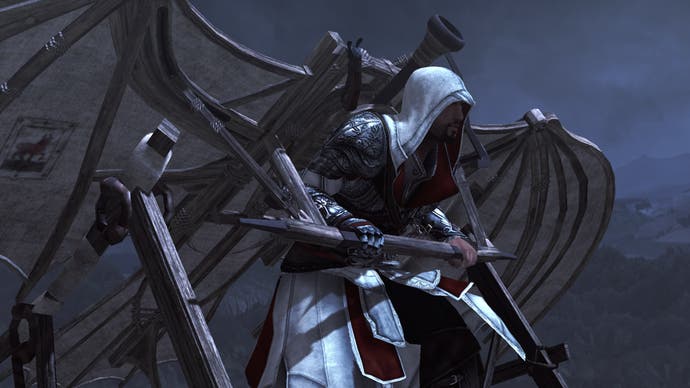
The team had wanted to tie up this particular story for some time, Hutchinson explains. "The Lucy twist [writers decided she would turn out to be a Templar triple agent] came about during the development of Brotherhood. When Desmond's story changed we realised we wouldn't need her any more."
It's telling that the marketing campaign for Assassin's Creed 3 does not include any mention of Desmond or his modern-day storyline. Clearly, the banner attraction is Connor and the lure of exploring vast swathes of colonial America. You won't see Desmond in any of the game's TV adverts, and the most I saw of him during an earlier press preview event was his face on the Animus loading screen. (The game's marketing also portrays the game as a more US-friendly, British-killing bloodbath, despite the actual tale being far more measured. Patriot leader George Washington is vilified for being weak, and blamed for the slaughter of Connor's village.)
It makes sense for the structure of the series' plot that whatever comes next - Assassin's Creed 4 or another Connor sequel - will break free from the intricacies of Desmond's storyline. Desmond's end is an acknowledgement of the fact he's become a hangover.
Still, the writers do their best to justify his demise within the game's narrative. It has to be Desmond who activates Juno's First Civilisation machine due to his rare lineage, a perfect distilling of the First Civilisation bloodline inherited from his ancestors. Genetically there's no one else in the world that's better matched. We're also told why Desmond was forced to make such a last-minute decision, one he couldn't refuse: Juno is shown to have been manipulating humans for hundreds if not thousands of years to reach this eventual outcome via the Pieces of Eden - fragments from her lost civilisation. No one has found the Grand Temple before now (allowing work to start on an alternative solution) because it has been deliberately hidden. This is seen in the protection once given to the place by Connor's tribe, themselves holders of a Piece.
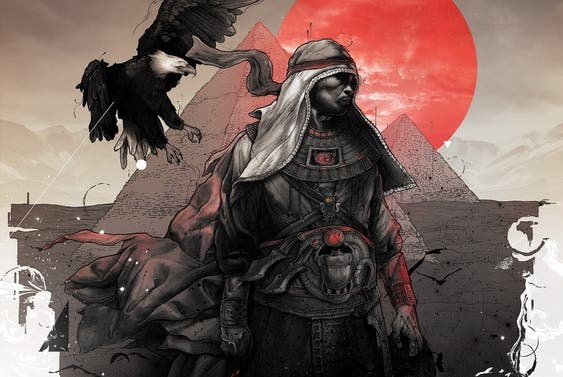
Alternative solutions to the apocalypse once existed, Desmond is told. This rare slice of exposition about the First Civilisation also answers a number of questions. They attempted to halt the solar flare cycle in their day by building towers to absorb its power, erecting an energy shield, using the enjoined minds of beings under the influence of Pieces of Eden, by predicting the future to communicate with later races about a solution, and by transforming themselves through bio-engineering and via transcendence - the ability to remove their consciousness from their bodies.
Transcendence is how Juno preserved herself in the Grand Temple walls, while her race's ability to divine the future explains how she and others are able to project interactive visions of themselves to appear. Juno is able to dissipate the flare using the radiation-absorbing towers - she mentions that work on these was restarted in secret for use at a later time. Finally, you could imagine that the reason a human lineage has select First Civilisation abilities such as Eagle Vision is due to an extension of the bio-engineering plans.
Despite all the house-clearing, there are a number of elements yet to be explained. Juno's successful escape sets up a powerful future antagonist, while the villainous organisation Abstergo is also still shown to be a threat. A voice heard as players re-enter the Animus appears to be from a Templar technician hacking into an imprint of Desmond's memories, sequenced when the young assassin was held at the facility. It's a narrative trick for allowing players to continue free-roaming after Desmond is dead, but the indication that the Templars can now access this information without a living subject draws into question whether the next Assassin's Creed game will even need a contemporary protagonist in the same way.
One of the series' initial draws was its intriguing dual-narrative structure, but the lure faded as Desmond's role became rote. There's a lot to be said for the fact that - knowing so much about the series' back-story - some of the fascination surrounding it has dimmed. A clean slate will provide a fresh space for the story to grow anew and scope for additional mysteries.
You've played your part well, Desmond. But it's the right time to move on.
